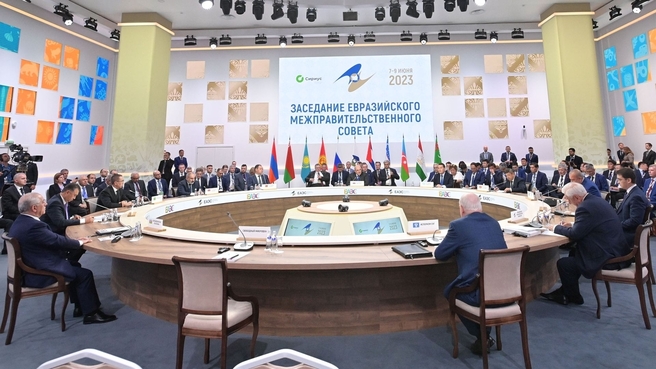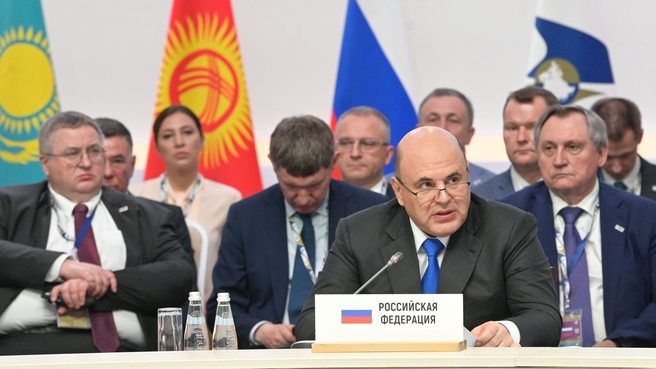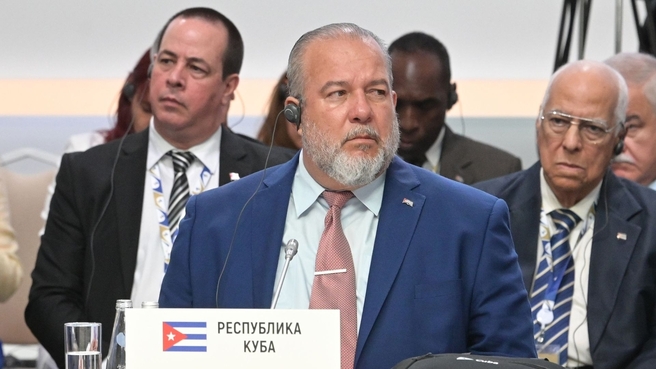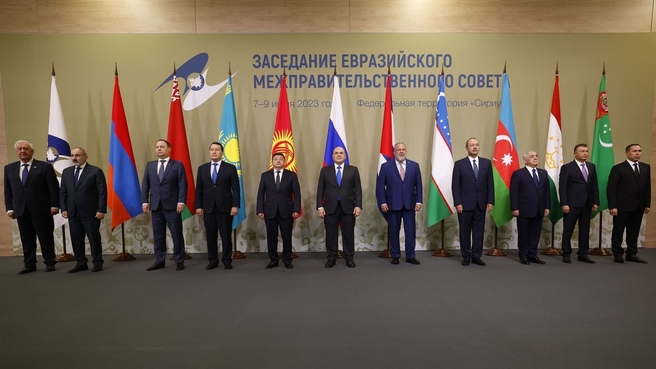Mikhail Mishustin: “Even amid the challenging international environment and Western sanctions imposed against Russia and Belarus, we managed to prevent the Union’s GDP from plummeting. Last year, it shrank by about 1.5% despite the more negative forecasts of certain foreign experts. This was largely due to our joint efforts to increase the stability of the economies of the Union’s member states. Anti-crisis measures have proven to be effective.”
Heads of delegations taking part in the expanded meeting of the Eurasian Intergovernmental Council:
Prime Minister of the Republic of Azerbaijan Ali Asadov;
Prime Minister of the Republic of Armenia Nikol Pashinyan;
Prime Minister of the Republic of Belarus Roman Golovchenko;
Prime Minister of the Republic of Kazakhstan Alikhan Smailov;
Prime Minister and Chief of Staff of the Presidential Executive Office of the Kyrgyz Republic, Chairman of the CIS Council of Heads of Government Akylbek Japarov;
Prime Minister of the Russian Federation and Chairman of the Eurasian Intergovernmental Council Mikhail Mishustin;
Prime Minister of the Republic of Cuba Manuel Marrero Cruz;
Prime Minister of the Republic of Tajikistan Kokhir Rasulzoda;
Deputy Prime Minister of Turkmenistan Hojamyrat Geldimyradov;
Ambassador Extraordinary and Plenipotentiary of Uzbekistan to the Russian Federation Botirjon Asadov;
Chairman of the Eurasian Economic Commission Board Mikhail Myasnikovich.
Mikhail Mishustin’s remarks:
Good afternoon, colleagues,
We are starting an expanded meeting of the Eurasian Intergovernmental Council. I would like to welcome the representatives of the union observer states who have joined us: the Republic of Cuba, our colleague from Uzbekistan, who will join us later, and the ambassador of Uzbekistan, as well as our honoured guests from Azerbaijan, Tajikistan and Turkmenistan. I am confident that our meeting will be engaging and meaningful for you.
Regardless of the meeting format we choose at the Commonwealth of Independent States or the Eurasian Economic Union, we are always united by a common goal: our commitment to expand joint integration projects in a wide range of areas, stimulate the growth of our economies, and work for the benefit of our citizens. This constructive attitude and friendly nature of our communication is very valuable.
At the meeting of our countries’ leaders, Russian President Vladimir Putin noted that through our further joint coordinated efforts we will achieve new substantial results in the advancement of integration in the interests of our nations. We are already seeing good indicators in our economies. Even amid the challenging international environment and sanctions imposed by the West against Russia and Belarus, we have managed to prevent the union’s GDP from plummeting. Last year, it shrank by about 1.5% despite the more negative forecasts of certain foreign experts. Mutual trade grew substantially by 14% percent against 2021, reaching nearly 6 trillion roubles. During this year’s first quarter, the amount of completed construction work increased by 9% and agricultural production grew by 3%, while fixed capital investments increased by over 4%. This was largely due to our joint efforts to strengthen the stability of the economies of the Union’s member states. Anti-crisis measures have proven to be effective.
We continued adopting decisions for future development, particularly to support a barrier-free business environment that is necessary to attract new investments. We believe this priority to be absolutely justified today. We must step up efforts to eliminate obstacles in the domestic market: the sooner we manage to do so, the more efficient our cooperation within the Union will become.
This year, the Russian Federation holds the chairmanship of the Eurasian Economic Union governing bodies. We are working to implement priority tasks outlined by Russian President Vladimir Putin early this year in his address to the leaders of the five countries. They involve all areas of Eurasian integration development, including the need for a prompt preparation of long-term strategic plans to determine major integration areas for the coming decades.
Trip
-
Mikhail Mishustin’s meeting with Prime Minister of Tajikistan Kokhir Rasulzoda
-
Conversation with Prime Minister of the Republic of Azerbaijan Ali Hidayat oglu Asadov
-
Mikhail Mishustin’s meeting with Prime Minister of Uzbekistan Abdulla Aripov
-
Mikhail Mishustin’s meeting with Prime Minister of Kazakhstan Alikhan Smailov
-
Expanded meeting of the Commonwealth of Independent States Heads of Government Council
-
Limited attendance meeting of the Commonwealth of Independent States Heads of Government Council
-
Restricted meeting of the Eurasian Intergovernmental Council
-
Mikhail Mishustin's meeting with Armenian Prime Minister Nikol Pashinyan
-
Mikhail Mishustin’s meeting with Prime Minister of Belarus Roman Golovchenko
-
Mikhail Mishustin’s meeting with Prime Minister of the Republic of Cuba Manuel Marrero Cruz
-
Mikhail Mishustin addresses opening ceremony of 2nd CIS and EAEU Youth Forum
With the existing strategy drafted in a completely different economic and international political environment, the new strategy must take into account the challenges that all of us are facing today.
One of our main tasks is to boost technological sovereignty and our common industrial base in major sectors.
Today, while touring the Eurasia Is Our Home exhibition, we could see companies from the five countries as well as partner states that seek to work together. Good initiatives are already there – and they are so plentiful that we did not have enough time to see them all. Some are under development, while others are ready to be implemented. Importantly, the manufactured products are of the same quality as their foreign counterparts.
I am certain that through our joint efforts and the use of competitive advantages we can manufacture products that are in demand – ranging from engines, vehicles and equipment to solutions for healthcare, education, scientific research, and other sectors.
It is important that we support such business aspirations. We have already agreed within the EAEU to create a supranational mechanism for financing cooperation projects from the Union’s budget. In May our leaders signed a Protocol on Amendments to the Treaty on the Eurasian Economic Union. I believe we must take every effort to ensure that next year this mechanism becomes fully operational and joint ventures receive such assistance.
At a meeting of the Supreme Eurasian Economic Council, Russian President Vladimir Putin also mentioned the need to start cooperating in technology with countries that are not members of the Union – namely, those that seek to form alliances on the basis of equality for creating new science-intensive production facilities. I am absolutely confident that such a format would be beneficial to all members.
One of our priorities is re-orientating trade flows towards areas that have better prospects. We are also developing new trade and logistics chains and creating the necessary infrastructure for international transport corridors – particularly, the North-South Transport Corridor with access to the states of the Persian Gulf, South and Southeast Asia, as well as to African countries.
In this regard, a key task is digitalisation and provision of technological equipment for all transportation processes, which will allow for faster border checks, optimised logistics, and a lower cost of document execution.
In April, an agreement on using navigation seals to monitor the traffic in the Eurasian Economic Union came into effect. We have already begun testing them for delivery of goods, and will use the results to assess their effectiveness.
I would like to particularly mention rail transportation. We have a very specific target: ensuring the implementation of the relevant action plan in the coming years. This will help us switch to an integrated electronic technology for transportation of goods by rail, first across the EAEU territory and then in third countries. I am speaking primarily about efforts to intensify cooperation with China as part of the implementation of the road map signed in February to boost cooperation between the EAEU and the People’s Republic of China.
Advanced solutions should be utilised in other industries as well. We should keep the pace of digital transformation based on an integrated information system that we are already jointly working on. A target programme has been approved for its development and the scope of requirements. At our restricted meeting yesterday, we discussed its implementation. Obviously, it is necessary to promptly carry out all the planned activities at the national level.
Another pressing issue is expanding our unique agro-industrial potential. Experts estimate that the EAEU has already reached full self-sufficiency in grain and vegetable oil. This year, we can also achieve similar results as regards certain items as well. We must actively utilise this resource and do it effectively, particularly in view of the current instability on foreign markets. We consider it necessary to create a comprehensive system for prompt monitoring of food security in all five member states, and also to establish an emergency food fund. This will help us promptly stabilise the situation, if need be.
The EAEU potential allows us not only to be self-sufficient in food production but also to export our products. We must make use of these opportunities.
An issue of great importance is the climate agenda, which is becoming an essential part of today’s economic development. Production facilities are being increasingly assessed for compliance with carbon footprint standards. Some countries and regional organisations are promoting their own mechanisms for transboundary carbon regulation. We also need to coordinate out approaches in this regard, expanding the exchange of the best available technologies and practices. By doing so, we will boost the competitive advantages of our five countries in the world markets and reduce the risk of obstacles to the movement of goods, services and capital.
In conclusion, I should mention the development of international cooperation. I have repeatedly noted that our integration association is open to everyone that shares our values.
We will continue to strengthen ties with friendly states and integration organisations, primarily the CIS, SCO, and ASEAN. Last year, we adopted a decision to commence negotiations on creating a free trade zone with the United Arab Emirates and Indonesia. We have also made significant progress in the dialogue with Egypt and Iran.
We stand for mutually beneficial and equal cooperation, and do not impose our rules of the game on anyone. This approach, along with the advantageous geographic location of the Union as a logistics and economic centre of the Greater Eurasian Partnership, creates an immense potential for greater trade and economic ties.
Friends, I am confident that the consistent efforts to deepen integration process in the Eurasian space serve the national interests of each of the five states. We share a common goal: to lay the groundwork for the stable development of our countries and improve the quality of life for our citizens. I am certain that together we will successfully attain these objectives.















